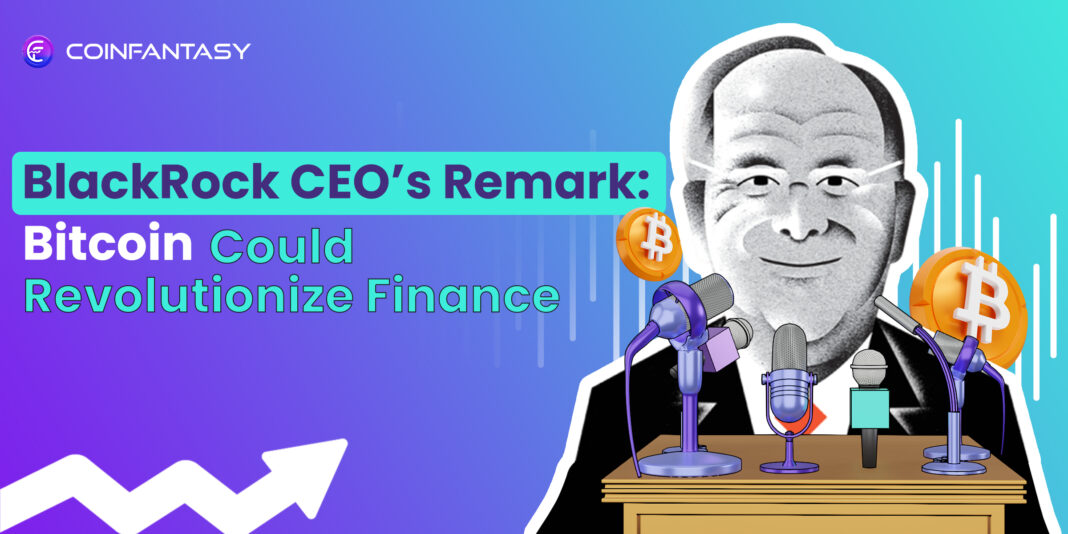By tokenizing assets and securities, BlackRock CEO Larry Fink thinks that digital currencies, notably Bitcoin, have a chance to transform the banking industry.
Fink did not specify a deadline for regulatory clearance after BlackRock’s iShares business applied for an instant Bitcoin exchange-traded fund (ETF).
Bitcoin is referred to as “digital gold” by Fink, who believes it may be used as a substitute for money for protection against volatility and country-specific difficulties.
Evolving Perspectives and the Participation of BlackRock
BlackRock CEO Fink’s renewed confidence coincides with BlackRock’s iShares subsidiary filing documentation with the Securities and Exchange Commission (SEC) for an upcoming Bitcoin exchange-traded fund (ETF).
Whereas BlackRock has an excellent history of obtaining SEC clearance for its ETFs, Fink did not specify a timetable for the Bitcoin ETF to make a judgment. He stated being optimistic about working together with authorities to achieve permission but admitted that the timetable is still unknown.
“We plan on working together with authorities to have the paperwork cleared one day,” Fink said. “However, I’m not sure when the applications will be authorized, so we’ll have to wait and see,” he added.
Considering Fink’s positive status, the market response to his remarks has been muted, with Bitcoin currently trading at a little under $31,000.
The Role of Cryptocurrency as “Digital Gold”
Fink defined cryptocurrencies as “digital gold” throughout the interview, emphasizing the value of Bitcoin as a digital asset. He claimed that Bitcoin may be used to replace conventional investments in actual gold as a hedge against inflation and the risks connected with certain nations or currency depreciation. Fink’s viewpoint shows that the investing environment is becoming more aware of the distinctive qualities and value offerings of cryptocurrencies.
Gold has traditionally been seen as a safe-haven investment that may be used to hedge against economic volatility. However, the rise of cryptocurrencies, particularly Bitcoin, calls into question established concepts of alternative investing.
The BlackRock CEO’s comments conflict sharply with those issued in 2017 when he referred to Bitcoin as an “index of money laundering.” Bitcoin was valued at $5,800 at that point, but it had increased by 470% in a year.
Bitcoin has proven its position as the largest cryptocurrency worldwide in terms of its monetary worth, with a present value of $30,068.84 and a market cap of $583,751,034,948 at the time of writing. The growing popularity and use of digital assets are reshaping the investing environment, driving major companies such as BlackRock to investigate crypto-related offers.
The Future of Cryptocurrency and Regulations
Fink’s support for cryptocurrency and BlackRock’s development of a Bitcoin ETF reflects the changing circumstances of the financial sector. As institutional investors understand the possibilities of cryptocurrencies, the regulatory framework supporting digital assets becomes more important. BlackRock’s ETF registration and work with authorities are anticipated to affect the development of crypto-related financial services.
Bitcoin Adoption Analysis
Based on the most recent research, merchant use of Bitcoin is predicted to climb by 50% over the next three years. This finding is based on an analysis of 300 payment leaders from 45 countries done by Ripple and Faster Payment Council.
The number of transactions in the crypto business has skyrocketed, with more than 5.5 million crypto payment customers expected in the United States alone by 2023.
Money transfers, cross-border B2B payments, card payments, and digital payments are among the most common four use cases for crypto payments. Remittances account for the majority of this, with international employees using cryptocurrency to avoid exorbitant transaction costs when sending money home to their relatives.
Furthermore, the expanding acceptance of Bitcoin payments through PayPal and Stripe has dramatically increased adoption. Aside from Bitcoin, stablecoins such as USDT and USDC have seen widespread popularity due to their low volatility. According to reports, utilizing stablecoins for cross-border payments is 80% cheaper than standard payment methods.
Approximately 97% of those surveyed anticipate that crypto payments will play a significant role in speedier payments during the next three years. Over half of the CEOs polled anticipate most shops to accept cryptocurrency payments over the next year.
According to the results of the survey, 64% of Middle Eastern payment company executives expect that more than 50% of businesses will begin taking cryptocurrency payments over the next three years. Many factors like the volatility and the market and statements by BlackRock CEO and others play a major role in driving Bitcoin’s price recently.
Europe comes in second with 58%, followed by North America (51%), and Africa (51%). On the other hand, around 17% of Latin American officials expect adoption will occur within this period. Furthermore, nations throughout the world, such as South Africa, Brazil, and Singapore, are making progress in their laws.
Closing Thoughts
As per the BlackRock CEO’s statement and Ripple & Faster Payment Council survey, Bitcoin is getting recognized by many leaders and organizations as well as it is increasing in adoption rate too.

